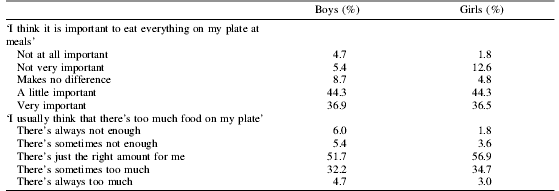Children may struggle to control their energy intake, particularly when parents are very controlling over what, when and how much they eat. When children are encouraged to ‘clean their plates’ they often override internal satiety cues and learn to eat by the size of the portion put in front of them(Reference Birch1). The aim of this study was to explore the eating attitudes of year 6 (age 10–11 years) children in relation to prevalence of overweight and obesity. Existing eating behaviour questionnaires for children have tended to focus on eating disorders and emotional eating(Reference Van Strien and Oosterveld2, Reference Schacht, Richter-Appelt and Schulte-Markwort3) rather than the motivators for eating habits. The Eating Attitudes questionnaire was developed based on the work of Wansink(Reference Wansink4). This questionnaire investigated children's attitudes to food via factors such as speed of eating, portion size and cues to eating. Ten questions were asked, such as ‘I think it is important to eat everything on my plate at meals’, and ‘I usually think that there's too much food on my plate’, and were scored on a five-point Likert scale. The questionnaire was completed by 318 children (boys n 151 [47.5%], girls n 167 [52.5%]) and 81% of respondents stated that it was either important or very important to eat everything on their plates and 37% thought that there was sometimes or always too much food on their plates.
Frequency table of the responses of boys and girls

There was no association between each question (Table) or with weight status (P>0.05). Most children thought it was important to clear their plates at meals. Many children claimed that there was sometimes or always too much food on their plates. The allocation of portion size by parents needs to be investigated.




